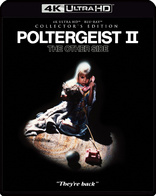Poltergeist II: The Other Side 4K Blu-ray Movie
HomePoltergeist II: The Other Side 4K Blu-ray Movie 
Collector's Edition / 4K Ultra HD + Blu-rayShout Factory | 1986 | 91 min | Rated PG-13 | Aug 27, 2024
Movie rating
6.2 | / 10 |
Blu-ray rating
| Users | 4.0 | |
| Reviewer | 4.0 | |
| Overall | 4.0 |
Overview
Poltergeist II: The Other Side 4K (1986)
The Freeling family settles into a new home following the annihilation of their former residence by terrifying visitors from the netherworld. But the spirits of the dead are still hell-bent on luring the family's clairvoyant daughter Carol Anne to "the other side"!
Starring: JoBeth Williams, Craig T. Nelson, Heather O'Rourke, Oliver Robins, Zelda RubinsteinDirector: Brian Gibson
| Horror | Uncertain |
| Thriller | Uncertain |
Specifications
Video
Video codec: HEVC / H.265
Video resolution: 4K (2160p)
Aspect ratio: 2.35:1
Original aspect ratio: 2.39:1
Audio
English: Dolby Atmos
English: Dolby TrueHD 7.1 (48kHz, 24-bit)
English: DTS-HD Master Audio 5.1 (48kHz, 24-bit)
English: DTS-HD Master Audio 2.0 (48kHz, 24-bit)
Subtitles
English SDH
Discs
Blu-ray Disc
Two-disc set (2 BDs)
4K Ultra HD
Packaging
Slipcover in original pressing
Playback
Region A (C untested)
Review
Rating summary
| Movie | 3.5 | |
| Video | 4.5 | |
| Audio | 4.0 | |
| Extras | 4.0 | |
| Overall | 4.0 |
Poltergeist II: The Other Side 4K Blu-ray Movie Review
Reviewed by Dr. Stephen Larson September 4, 2024Brian Gibson's Poltergeist II: The Other Side (1986) has previously been covered on our site by myself and Casey Broadwater. Casey wrote about MGM's standard release thirteen years ago while I reviewed Scream Factory's "Collector's Edition" in 2017. To read our impressions of the film and each Blu-ray presentation, please refer to the linked reviews above.
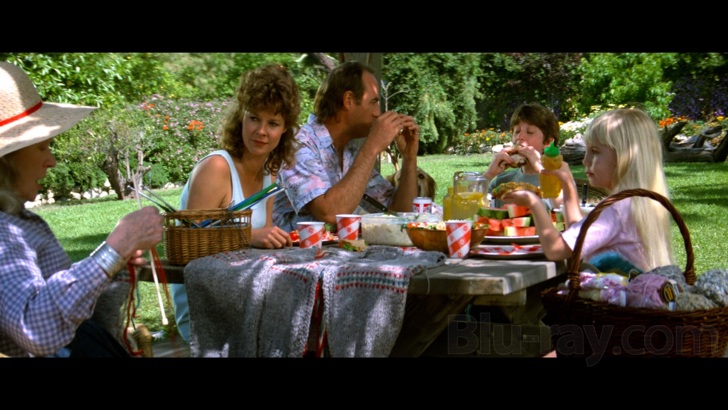
Freelings' summer lunch with Gramma Jess.
Poltergeist II: The Other Side 4K Blu-ray Movie, Video Quality 
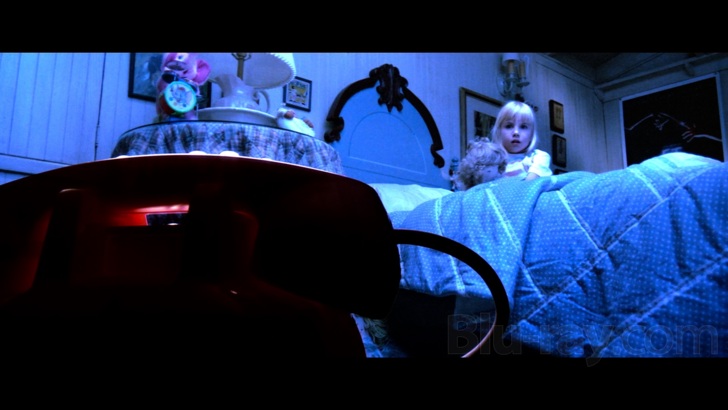
Note: Over 60 percent of my screen captures are pulled directly from the UHD disc. They have been downscaled to 1080p. They don't encompass the full HDR and thus not completely representative of the film's color values compared to when projected at 2160p.
Scream Factory's latest Collector's Edition of Poltergeist II comes with a two-disc 4K Ultra HD and Blu-ray set. The new slipcover and cover art on the case replicates the original theatrical's one-sheet poster. The UHD is encoded with Dolby Vision on a BD-100 (disc size: 72.6 GB). The transfer is based off a recent 4K restoration from the original camera negative. The enclosed Blu-ray is struck from the same scan. Scream's inaugural disc was made from a 2K scan of the film's interpositive. Colors on the 4K are bolder and more vivid. Image texture is well-maintained along with a thin layer of grain. I upscaled the Blu-ray to 4K on my Panasonic player and found color detail relatively similar to the UHD. I didn't notice any color bleeding. Black levels are super deep and crisper when viewing the film with DV or the HDR on, though. I studied the 2160p transfer on a smaller 4K screen and only spotted a couple blemishes. For example, a few small white specks are visible around Tangina in her first scene.
I was most interested to see how the two recent discs handled both the 35 mm anamorphic photography and several of the practical effects, which were originally shot in 65 mm. They are transferred very well for the most part. One shot of a cloud hovering over Gramma Jess's house in a dream scene never looked that convincing (and probably didn't either for audiences who saw it on a big screen in 1986). But much of the other work by the Boss Film Corporation is strong and holds up today. In an interview with Ron Magid for the July 1986 issue of American Cinematographer, director of photography Andrew Laszlo told the magazine he and his crew worked side by side with Boss Film to integrate the matte shots, blue screen elements, and other effects footage, which required 65 mm equipment for capturing. Laszlo praised the technical and practical work of Bill Neil, Boss Films' DP, and his team, explaining they achieve "a much more detailed and sharp negative...The negative image is quadrupled from 35mm, so that everything is four times as sharp and four times as well defined" (p. 52).
Laszlo said in the article that was he especially proud of his crew's work for the scenes shot in an ancient subterranean cave. (See Screenshot #s 14-16.) This was a real cave with a full ceiling and lighting it was particularly difficult. The cave contained a stone tunnel with dripping water, which caused cast and crew to slip all over the place. Laszlo noted in addition to using candles, the actors also carried Coleman lanterns, which Laszlo recalled his crew using on the set of First Blood (1982). Filming these scenes necessitated rapid camera movements, handheld shots, the Panaglide, and dolly shots.
For the astral dimension sequence, there is an important difference with how certain shots are color-timed when comparing the earliest home video transfer to how Poltergeist II has recently looked on Blu-ray and UHD. When I examined MGM/UA's LaserDisc transfer from 1986, I immediately saw how the background differs from subsequent transfers. For instance, notice in Screenshot #33 that it's tan, which is not unlike the sandy beige shown while Taylor drives through a blustery wind when trying to locate the Freelings in the beginning. When MGM/UA re-released the film on LD in its native 2.35:1 five years later, the background casts a grayish blue (see frame grab #34). This is the same color scheme seen on both of Scream's releases. (I don't own the MGM R1 DVD or MGM region-free BD so I don't know how it appears on those.) Based on my research into Poltergeist II's production, I believe the grayish blue seen on the '91 letterboxed LD and Scream discs is what the filmmakers wanted. Film writers Hora Lee and Janine Pourroy wrote an article about virtually all of the movie's effects work for CineFex in May 1986 and discussed the color palette for the Astral dimension. According to Gary Waller, the special projects supervisor at Boss Film whom the authors interviewed, Mark Vargo (optical supervisor at Boss Film) tinted the background blue. Director Brian Gibson wanted very specific shades of blue. The cloud tank Boss Film had been working with still had a green tint to it that could not be fully tweaked. The issue was that the 5243 intermediate film stock employed in optical work does not yield as precise blues as it can reds and greens. Gibson sought steely blues, grays, and purples (notably mauve, which is seen in parts of other shots in this sequence). Vargo and Boss Film chose to make a standard color interpositive and from that, a 5360 direct positive from the color interpositive. To put the finishing touches on the palette, Boss Film burned blue light into it so the blue had a noticeable tint.
Other disparities in color temperature between the '86 LD and later transfers have to do with how skin tones are rendered and image brightness. For example, the close-up on Steve Freeling in #25 shows his face to be very pale, but on the '91 LD, it take on a darker compexion in #26. Scream Factory's 4K and Blu-ray have more a natural tone (as show in #s 27 and 28). The shot on the '86 LD of Diane Freeling awakening from a dream in #29 should have been darker but is in the other three transfers.
Scream Factory has done an excellent job with encoding the UHD disc. The feature carries a mean video bitrate of 85.0 Mbps and the BD-100 has an overall bitrate of 99.0 Mbps. The newest Blu-ray delivers an average video bitrate of 29940 kbps.
Screenshot #s 1-20, 24, 28, 32, 36, & 40 = Scream Factory 2024 4K Ultra HD BD-100 (downsampled to 1080p)
Screenshot #s 21, 25, 29, 33, & 37 = MGM/UA Home Video 1986 Full Screen (1.33:1) LaserVision
Screenshot #s 22, 26, 30, 34, & 38 = MGM/UA Home Video 1991 Deluxe Letter-Box (2.35:1) Edition
Screenshot #s 23, 27, 31, 35, & 39 = Scream Factory 2024 BD-50 (based off 4K restoration)
For screen captures of MGM's transfer, please click here. For my grabs of Shout's 2017 transfer, please click here.
Scream's standard twelve chapter selections are available for accessing scenes on both discs.
Poltergeist II: The Other Side 4K Blu-ray Movie, Audio Quality 
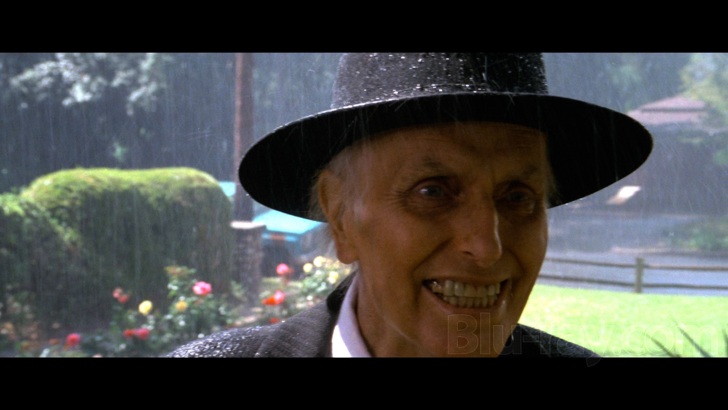
Scream has supplied three audio track options to watch Poltergeist II with on both the UHD and Blu-ray (in addition to two archival commentaries): a new Dolby Atmos mix (Dolby TrueHD 7.1 compatible), a 5.1 Surround track encoded with DTS-HD Master Audio (4182 kbps, 24-bit), and a LaserDisc audio 2.0 mix in DTS-HD MA, which has been upsampled from its original 16 bit to 24 bit at an average of 2003 kbps. I first listened to the Atmos track, which is a mixed bag. On the plus side, bass and fidelity are outstanding for the directional sound f/x. A big thunder clap makes its presence heard along the fronts for the "power spot" at Spider Rock where Taylor and a shaman conduct an ancient ritual. For the robust action scenes inside Gramma Jess's abode, loud thumps and thuds fill the rears and their height channels. In addition, there's occasional rumbles of LFE from the sub. On the negative side, dialogue is mixed too low. I had to turn the volume up to hear conversations at the roadside diner and some of the interior scenes at Gramma Jess's home. The Atmos seems to duplicate a line spoken by the apparition of Rev. Henry Kane. (It loops it in twice.) The "core" bitrate for the Atmos track is around 3651 kbps. It averages 4291 kbps for the full runtime. On the UHD, the bitrate gets as high as 5280 kbps.
In 1997, MGM/UA Home Video released a third LD of Poltergeist II, which placed a Dolby Digital AC-3 mix on one of the two analog tracks. MGM skipped putting the 5.1 track on any of its DVDs. It did not reappear until the American and European Blu-ray releases in the early 2010s. Scream Factory ported it over for its maiden edition in '17. The DTS-HD MA 5.1 on the two new discs is not the same mix. It produces more singular surround effects on the back stage compared to the older 5.1, which delivers reverbs from the matrixed stereo. It's nice to have another 5.1 option.
In the booklet for Intrada Records' three-CD set of Jerry Goldsmith's score for Poltergeist II, soundtrack producer Douglass Fake provides an excellent overview for how the music and other sound elements were mixed. Music was recorded at MGM Studios using Sony's PCM 3324 format 24-track recording method. There were additional mixes later done in both Sony's PCM 1610 digital two-track format and on ½" three-channel analog tape. The digital tracks were used for the soundtrack album and listening purposes. The analog tape was handed over to the re-recording crew and blended with dialogue and sound effects for the composite soundtrack, which was incorporated into the film. According to Fake, who was involved very early on to help produce a score album on CD and LP for Intrada in 1986, recording engineer Bruce Botnick created the two-track digital mixes. Goldsmith supervised the deployment and balance of electronics with the orchestra. In other words, the composer determined how they were dispersed across the sound field. The analog mixes were designed for the film's four-channel matrixed Dolby Stereo theatrical release format, which used an LCRS configuration (left, center, right, and mono surrounds). Fake spoke to Botnick about the main difference between the two mixes. Botnick told him that electronics were enhanced in chosen sequences of the analog mix. These were matrixed into the surround channel. Botnick and Goldsmith sometime did not want music coming out of the center channel because it would compete or interact too much with the dialogue. Goldsmith's music sounds wonderful on the UHD and Blu-ray mixes. I could distinctly hear French Horns along the rears while listening to the Atmos track.
Scream does not specify which stereo mix it took from the film's LD editions. I've listened to the 1986 and '91 mixes. I can basically confirm that it's the digital track from '91. The 2.0 mix is solid and workmanlike. It does a very good job balancing effects between the the left and right surround channels.
I prefer the stereo track from the '86 LD, which sounds similar to the '91 mix. They're each derived from the same magnetic elements but their delivery of sounds are not identical. The '86 track is a little more detailed. It has more pronouncements of the lower-end sounds. For example, I could really hear the wind howling along two of the back speakers during the main titles. It seemed to have a bit more detail and sounded deeper than the '91 mix that is on the UHD and Blu-ray. The '86 mix delivers excellent dynamic range. It felt that four or five of my speakers were active most of the time. I could hear a thunder clap on the rears, too.
Why does the '86 track sound a little better than the '91 track to my hears? Likely how each one was mixed. The LD jacket from '86 bears the imprint "Videophonic Sound." Steve Weiner, a home video writer whose columns were syndicated in New York newspapers during the Eighties, wrote an article in '86 that briefly discusses the then-new sound format MGM/UA Home Video would be applying on its Beta HiFi and VHS HiFi releases. Weiner quotes Peter Anderson, who was then vice president of technical operations for MGM/UA: "Videophonic Sound duplication promises a totally new listening experience. It delivers pure, clean, crystal clear stereo, free of distortion caused in the duplication process." Weiner touts this as the studio's "exclusive and unconditional guarantee of the finest audio quality on videocassette." Weiner does not mention that at least a handful of movies and concert films in MGM/UA's catalog would also utilize the same sound-encoding process on its LaserDisc releases.
Scream Factory has made an odd case formatting choice for the English subtitle track. Transcriptions of spoken words are in ALL CAPS. See Screenshot #s 18-20.
Poltergeist II: The Other Side 4K Blu-ray Movie, Special Features and Extras 
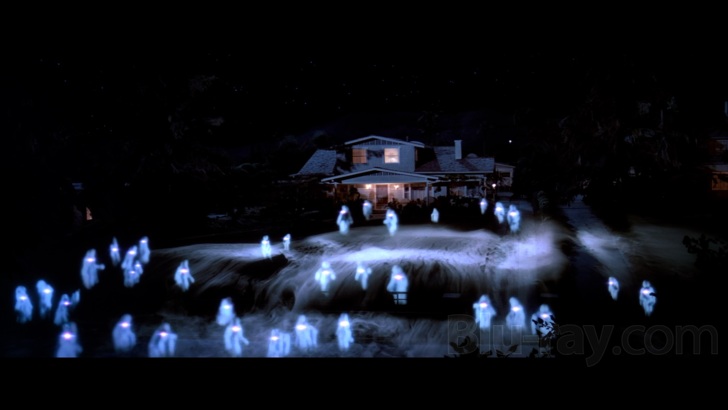
Scream has retained extras from its 2017 CE except for the Poltergeist II shooting script, which is accessible as a slide show on the disc released seven years ago. Apparently, Scream wasn't able to renew copyright clearances with either MGM or co-writers Michael Grais and Mark Victor.
DISC ONE: 4K UHD
- Audio Commentary with Writer/Producer Michael Grais - Red Shirt Pictures' Michael Felsher moderates this feature- length commentary with co-writer Grias, which is only occasionally screen specific. Grais covers his background in film, his relationship with Steven Spielberg on Poltergeist, working with several of the actors on the sequel, and difficulties he had with Brian Gibson in post-production. There are a handful of gaps but they are not lengthy. Felsher generally asks good questions but queries Grais with lots of closed-ended questions that don't encourage many in-depth responses. In English, not subtitled.
- Audio Commentary with Poltergeist II Webmaster David Furtney - Poltergeist fan site editor Furtney delivers an informative and dry commentary on how the scripts compare to the finished film. This has more lags than the first commentary but Furtney has done his homework well. I re-listened to this track and while it has some gaps, it has a lot of fun facts about the film, scripts, and novelization. In English, not subtitled.
DISC TWO: Blu-ray
- Audio Commentary with Writer/Producer Michael Grais - Red Shirt Pictures' Michael Felsher moderates this feature- length commentary with co-writer Grias, which is only occasionally screen specific. Grais covers his background in film, his relationship with Steven Spielberg on Poltergeist, working with several of the actors on the sequel, and difficulties he had with Brian Gibson in post-production. There are a handful of gaps but they are not lengthy. Felsher generally asks good questions but queries Grais with lots of closed-ended questions that don't encourage many in-depth responses. In English, not subtitled.
- Audio Commentary with Poltergeist II Webmaster David Furtney - Poltergeist fan site editor Furtney delivers an informative and dry commentary on how the scripts compare to the finished film. This has more lags than the first commentary but Furtney has done his homework well. I re-listened to this track and while it has some gaps, it has a lot of fun facts about the film, scripts, and novelization. In English, not subtitled.
- Robbie's Return – An Interview with Oliver Robins (14:25, 1080p) - Robins was in junior high when he portrayed Robbie Freeling in Poltergeist II. He addresses how the film became a nice respite from the bullying and teasing he endured in school. Robins looks back fondly at the sequel and discusses working with Heather O'Rourke and Brian Gibson. In English, not subtitled.
- The Spirit World – An Interview with Special Effects Designers Richard Edlund, Steve Johnson and Screaming Mad George (22:09, 1080p) - extensive interviews with three members of the special effects team. They explain how they achieved the creature effects. In English, not subtitled.
- Ghosts of Giger – A Look at the Contributions of Artist H. R. Giger Featuring Rare Photos and Illustrations and an Interview with Giger's Friend and Agent Les Barany along with Special Effects Designer Steve Johnson, Richard Edlund and Screaming Mad George (21:02, 1080p) - a tribute to the late H. R. Giger. Giger's collaborators discuss the f/x designer's paintings and voluminous drawings. In English, not subtitled.
- They're Back: The Making of Poltergeist II (6:16, 1080p) - an original production featurette MGM produced in 1986. Features interviews with executive producer Freddie Fields, writer/producer Mark Victor, visual effects producer Richard Edlund, special effects designer H. R. Giger, director Brian Gibson, writer/producer Michael Grais, and actor Jobeth Williams. Presented in 1.33:1. In English, not subtitled.
- Monster Shop (2:46, upconverted to 1080p) - behind-the-scenes on the set of Poltergeist II. This short featurette contains interview snippets with director Brian Gibson and special effects supervisor Richard Edlund. It also shows some conceptual art drawings and props for the creature effects. It's basically an abridgment of the first featurette. Presented in 1.33:1. In English, not subtitled.
- Ghostmakers: The Magic of Poltergeist 2 (6:28, 1080p) - a 1985 featurette that contains interviews with Edlund, Gibson, Giger, creature design coordinator Steve Johnson, as well as actors Craig T. Nelson and Jobeth Williams. Shows how the effects were planned and shot (in 65 mm!). Presented in 1.33:1. In English, not subtitled.
- Theatrical Trailer (1:23, 1080p) - MGM's original teaser trailer for Poltergeist II. In English and presented in 1:85:1 anamorphic widescreen.
- TV Spots (2:04, upconverted to 1080i) - four TV spots promoting Poltergeist II. Presented in 1.33:1 and appearing in decent shape.
- Still Galleries (6:12, 1080p) - a montage of over seventy behind-the-scenes photos, production stills, lobby cards, US and international posters, press kit material, and memorabilia from Poltergeist II. Presented in color and black and white.
Poltergeist II: The Other Side 4K Blu-ray Movie, Overall Score and Recommendation 
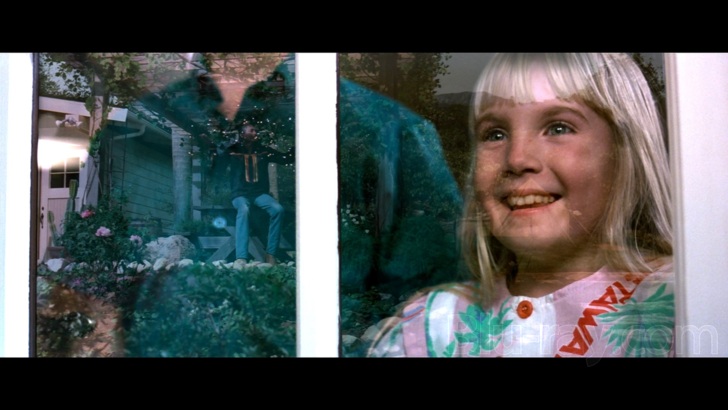
I was recently browsing a video restoration blog (blog.sporv.com) and saw under its master list of workprints that a 130-minute version of Poltergeist II supposedly exists. (There are murmurings that the Library of Congress possesses it, but official confirmation still awaits if it's been archived, catalogued, and preserved.) While Scream Factory doesn't include any alternate cuts of the film in this package, the theatrical version looks as good as it's ever looked on this 4K UHD. The new Dolby Atmos mix definitely delivers some heavy sound effects but dialogue passages are occasionally mixed below normal listening levels. It's a bonus to have one of the LaserDisc audio mixes, which does a better job of registering spoken words along the fronts than the Atmos. All extras sans the shooting script have been ported over. This is the best overall presentation of a good sequel that comes with a VERY SOLID RECOMMENDATION from me.
Other editions
Poltergeist II: The Other Side: Other Editions

Poltergeist II: The Other Side
1986

Poltergeist II: The Other Side
1986

Poltergeist II: The Other Side
Fox Halloween Faceplate
1986

Poltergeist II: The Other Side
Collector's Edition
1986
Similar titles
Similar titles you might also like

Poltergeist III
Collector's Edition
1988

Poltergeist 4K
1982

Insidious: The Last Key
2018

Poltergeist 3D
Extended Cut
2015

We Are Still Here
2015

Amityville 3-D
1983

Mama 4K
Mamá 4K | Collector's Edition
2013

The Bye Bye Man
2017

Dark House
Haunted
2014

The Dead Room
2015

Before I Wake
2016

The Haunting in Connecticut 2: Ghosts of Georgia
2013

The House by the Cemetery 4K
Quella villa accanto al cimitero
1981

V/H/S
2012

Annabelle Comes Home
2019

Halloween II
Unrated Director's Cut
2009

Jeepers Creepers 2
Collector's Edition
2003

Scary Stories to Tell in the Dark 4K
2019

Insidious 4K
2010

Insidious: Chapter 2
2013
